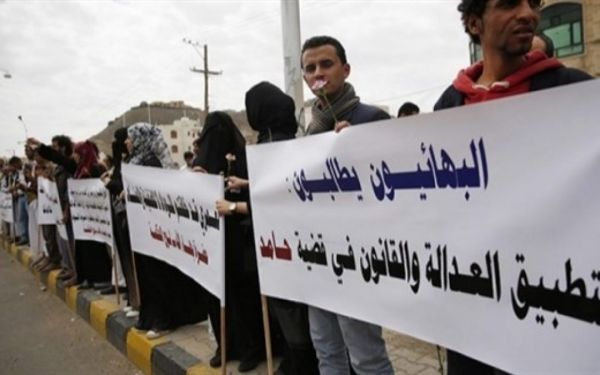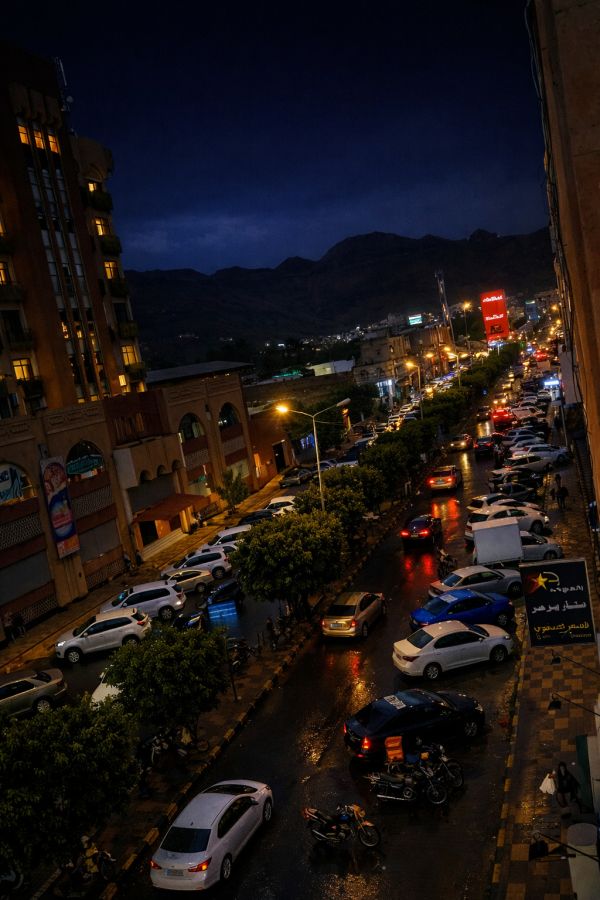الأخبار
- English
The Religious Minorities in Houthis militia's time.... 8 years of displacement, ill-treatment & oppression
Alasimaonline - Special Report
السبت, 24 سبتمبر, 2022 - 04:04 مساءً
Since the first day of seizing power, Houthis militia has deliberately displaced the religious minorities that have been living peacefully with all segments of Yemeni society for thousands of years practicing various types of oppression and displacement, in addition to illegal trails, threat of exile, confiscating property, false accusation of treason & spying for Israelis.
Religious minorities are sects who embrace other religion than the majority of the country population believe in. In Yemen, there are religious minorities such as Jews, Bahais and Ismailis, besides Christians and nonreligious arrived from Horn of Africa.
The manifestations of hostility of Houthis militia to the religious minorities since its coup are no secret to anyone. The religious minorities found themselves under the whip of the executioner who disregarded international and human rights laws and only succumbed to foreign diktats.
Yemenite Jews
Yemenite Jews are basic component of Yemeni society component. They have been living with peace and co-existence throughout the past centuries with Muslims who constitute the vast majority of Yemen population.
Yemenite Jews have lived in different places of Yemen due to their handicraft and business they practiced, most notable Raidah, Arhab, Amran, Sa'dah and the housing complex in Sana'a.
When Houthis militia completely took control over Sa'dah province, displacement of Jews started. At that time, about 70 people of Aal Salem tribe, who were the last people of Jews in the area, were displaced to Sana'a as INSAF Center for Defending Freedoms & Minorities reported.
Yemenite Jews accused Houthis militia of practicing intimidation and threatening against them, in addition to kidnapping jewish women and were married off to persons belong to Houthis group by some Houthis militia's members in a way that breaches the international norms and laws.
Detentions and chases :
The jewish Labibi Salem was arrested by Houthis authorities in 2016 on suspicion of helping to smuggle a 500-year-old ancient Torah scroll along with 17 members of the Yemeni jewish to Israel.
During the past years, Labibi family pursued his issue in order to free him from Houthis jails but Houthis authorities in Sana'a rejected to implement the decisions of the courts that stated to immediately release him and no reason to still detaining him except his jewish religion.
During the detention years, Labibi was subjected to various types of torture, as a result, he had a stroke caused hemiplegia, in addition to other many chronic diseases as INSAF Center for Defending Freedoms and Minorities reported.
INSAF Center indicated that Labibi suffered from bad health conditions in the prison, besides suffering from kidney and lung diseases, it added that he lost all his teeth due to medical negligence and ill-treatment.
Sana'a Public Funds Prosecution determined his innocence and the others detainees on the same case who were later freed except Labibi.
Later in March 2021, Labibi family and two other jewish families forced to leave Yemen after Houthis militia agreed to free Labibi if the two families left Yemen.
"We are forced to depart Yemen in order to free Labibi from Houthis prison, the history will record that we are the last jewish families that still cling to their motherland till the last moment," one member of the families said.
Apostasy judgement:
The situation of Baha'i community wasn't better than jews, it was imposed to much oppression as Houthis militia arrested Baha'i cult members after taking control over Sana'a in 2014 demanded them to immediately leave Yemen if they wanted to be released.
In September 2018, a Houthis militia's court accused more than 20 Baha'is of apostasy and spying for Israelis and 6 others were forced off Yemen as stated in a book entitled "minorities in Yemen, reality and challenges" issued by INSAF Center for Defending Freedoms and Minorities.
Also, Houthis militia sentenced to death Baha'i member Hamed Haidrah, that was condemned by local and international rights organizations, to be the first rule in Yemen regarding the freedom of religion issues since the unification day in 1990.
A statement issued by Yemeni initiative for Defending Baha'is rights indicated that the judgement was unfair and systematically targeted the whole Baha'i minority due to its faith, the statement also stated that Haidrah was subjected to torture and ill-treatment, deprived of medical care and was forced to sign false confessions, besides other 6 Baha'is were still in jails.
Houthis' oppression and Baha'is
Baha'is women also were not in safe place in Houthis militia's time. Baha'i woman member Rohiyah, who was the Chief of a civil society organization in Sana'a, was arrested with 66 other Baha'is members including women and children when Houthis militia's specialized security forces raided a Baha'i civil event in 2016 as Rohiyah said.
The establishment directed by Rohiyah was closed by Houthis militia. Then, she was released with her husband in preparation for leaving Yemen.
Rohiyah indicated that she managed to leave Yemen through travelling from one place to another.
"Houthis militia accused us of spying and conspiracy against Yemen and nowadays we were tried in absentia in spite of the general amnesty issued in March 2020," Rohiyah added.
 لمتابعة الموقع على التيلجرام @Alasimahonline
لمتابعة الموقع على التيلجرام @Alasimahonline
تعليقات
اقرأ ايضاً
آخر الأخبار
كاريكاتير

الأكثر قراءة
قتلى وجرحى بينهم قيادي في المليشيا بصنعاء.. مواجهات عنيفة ...
مسؤول حكومي: الحوثيون يحولون رمضان إلى موسم قمع ويواصلون ...
المحويت.. مقتل قيادي حوثي بارز خلال حملة للمليشيا على قبائل ...
تصعيد جديد في صنعاء.. منظمة: الحوثيون يمنعون زيارة الشيخ ...
الجالية اليمنية في ماليزيا تقيم الإفطار الرمضاني السنوي ...
العاصمة اليوم

تقرير حقوقي صادر عن مركز العاصمة الإعلامي
الأحد, 13 أغسطس, 2017

ندوة مركز العاصمة الإعلامي
الأحد, 13 أغسطس, 2017

المرأة في صنعاء لا حرمة لها.. مركز العاصمة الإعلامي يرصد ...
الخميس, 01 يناير, 1970

مركز العاصمة الإعلامي يشهر دراسة بحثية عن استراتيجية إيران ...
الخميس, 01 يناير, 1970









